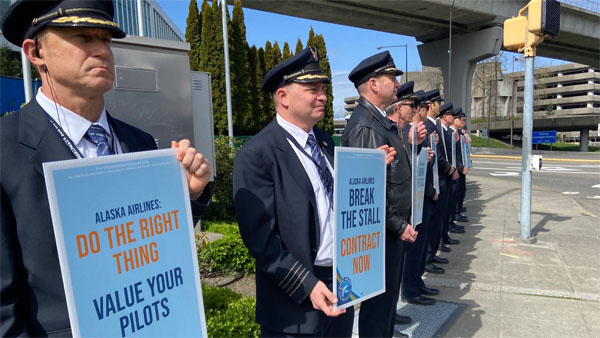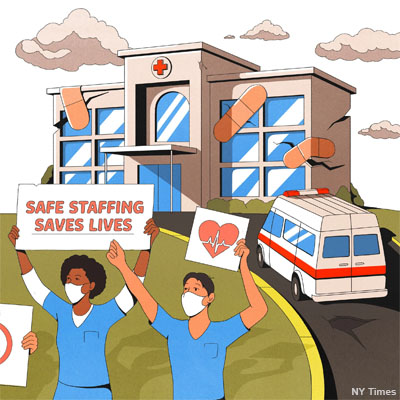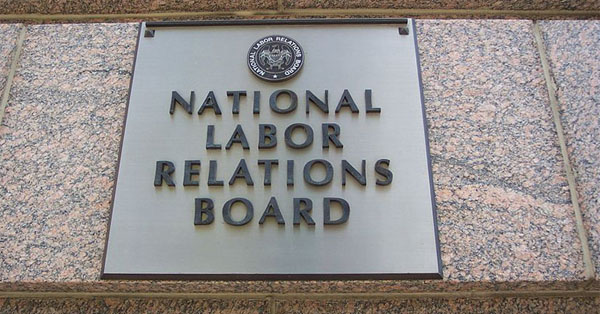NEWS ROUNDUP
Pilots’ strike vote | Labor peace agreements | Good riddance, globalization
Monday, May 9, 2022
LOCAL

► From Q13 — Alaska Airlines pilots prepare to vote on strike-authorization, as cancellations pile up — Alaska Airlines pilots will begin to vote on Monday whether they want to go on to authorize a strike. The decision won’t happen overnight. While the strike-authorization vote will wrap up later this month – the fallout would not be immediate. A deal could still be struck before pilots would officially strike. Capt. Will McQuillen, chairman of the Alaska Airlines ALPA MEC:
“Alaska pilots are not looking to strike. We are looking for improvements to our contract in line with the market but that will also allow our company to grow and remain successful and competitive. However, we are willing to take any lawful steps necessary, including a legal strike, to achieve the contract every Alaska pilot has earned.”
 ► From the Columbia Basin Herald — Letter Carriers to hold May 14 food drive — Letter carriers across Grant County will be gathering boxes and cans of food on Saturday, May 14, as part of the National Association of Letter Carriers’ annual Stamp Out Hunger food drive. “We’re inviting the community to participate by just leaving canned goods at their mailbox,” said Gary Schleppenbach, a 27-year veteran of the U.S. Postal Service and head of the local letter carrier’s association.
► From the Columbia Basin Herald — Letter Carriers to hold May 14 food drive — Letter carriers across Grant County will be gathering boxes and cans of food on Saturday, May 14, as part of the National Association of Letter Carriers’ annual Stamp Out Hunger food drive. “We’re inviting the community to participate by just leaving canned goods at their mailbox,” said Gary Schleppenbach, a 27-year veteran of the U.S. Postal Service and head of the local letter carrier’s association.
► From the union-busting Columbian — Stamp Out Hunger food drive seeks volunteers — To participate in this year’s food drive, simply leave a nonperishable food donation in a bag by your mailbox by 9 a.m. on May 14, and your letter carrier or volunteer will do the rest. You can also donate online. Event organizers are seeking volunteers to participate on the day of the event. Volunteers will assist mail carriers with picking up food.
The Stand (April 29) — NALC’s food drive will be Saturday, May 14
► From the (Everett) Herald — Trades program building students’ careers and lives (editorial) — Partnering with Everett Community College and several trade unions and construction associations, the Regional Apprenticeship Pathways program at Marysville Pilchuck High School offers a multi-hour course that earns students math, English, physical education and other credits toward high school graduation as well as college manufacturing course credits and helps them develop a resume and skills to connect with representatives in the industry.
► From the Peninsula Daily News — Sequim Schools to cut staffing — The Sequim School Board has unanimously approved cutting the equivalent of 11 staffers for the 2022-2023 school year, including eliminating the position of an administrator who has filed complaints against the district.
► From the (Everett) Herald — Bus ridership grows as gas prices soar — Employers calling staff back to in-person work also is a factor behind greater mass transit usage.
THIS WASHINGTON
 ► From the Seattle Times — Beloved Seattle Colleges programs are safe for now, but their long-term fate remains unclear — For the moment, officials say the Maritime Academy, Wood Technology Center and Seattle Central’s Culinary Arts and Apparel Design and Development programs are safe. But school leaders warn that the future remains unclear, with much work to be done to make the hands-on programs more financially sustainable as the school system claws itself out of a massive budget deficit. The current shortfall has been fueled by declining enrollment, the sudden need to focus more resources on responding to the pandemic, and what school officials say is an inadequate funding mechanism from the state Legislature.
► From the Seattle Times — Beloved Seattle Colleges programs are safe for now, but their long-term fate remains unclear — For the moment, officials say the Maritime Academy, Wood Technology Center and Seattle Central’s Culinary Arts and Apparel Design and Development programs are safe. But school leaders warn that the future remains unclear, with much work to be done to make the hands-on programs more financially sustainable as the school system claws itself out of a massive budget deficit. The current shortfall has been fueled by declining enrollment, the sudden need to focus more resources on responding to the pandemic, and what school officials say is an inadequate funding mechanism from the state Legislature.
The Stand (May 6) — How community action saved Seattle Central training programs (by Cortney Marabetta) — The Legislature needs to prioritize CTC funding to end such self-destructive proposals.
► From Crosscut — Gov. Inslee won’t lift WA’s vaccine mandate for state employees yet — The vaccine mandate for state employees and other pandemic restrictions will continue for now, he said Saturday. Case numbers have been climbing again in some parts of the state, but hospitalization and fatality rates are not increasing at the same rates. Inslee maintained that Washington’s approach to the pandemic has clearly been very successful.
► From the (Longview) Daily News — More training, possibly better benefits to come for Cowlitz 911 dispatchers thanks to new state law — The law creates a bureaucratic switch, where 911 dispatchers at government-run centers will no longer be considered administrative support, opening up the possibility of better state benefit plans and earlier retirement, similar to police and fire personnel.
HEALTH CARE
► From OPB — Nurses at Providence St. Vincent in Portland vote to go on strike — If pay, time off and health benefit demands aren’t met soon, the hospital’s 1,600 nurses have authorized their union, the Oregon Nurses Association, to lead a strike.
 ► From NY Times — When health care workers are protected, patients are, too (by Gabriel Winant and ) — American health care is a public system in the sense that the government paid for much of it and gave it its current shape, but it’s divvied up for administration across private owners. This means that savings often take the form of holding down wages and, if that becomes difficult, suppressing staffing levels relative to patient needs. If the government doesn’t step in to stabilize the health care labor force, patients suffer and overworked and underpaid health care workers quit or go on strike, which drives up costs further and will likely hurt patients. Unionized health care workers all over the country are fighting back against untenable conditions in the health care industry, and they are often met with harsh treatment by employers for doing so. The labor movement, and some cities and states, have come up with one way to stabilize the system: requiring health care employers to make what are known as labor peace agreements with their unions. Under these deals, employers and employees must work together to prevent strikes, which means finding mutually agreeable paths for workers to have a voice. Employers are generally restrained from retaliating against employees or from refusing to respond to their grievances. And if the sides cannot reach agreements, they must go to arbitration.
► From NY Times — When health care workers are protected, patients are, too (by Gabriel Winant and ) — American health care is a public system in the sense that the government paid for much of it and gave it its current shape, but it’s divvied up for administration across private owners. This means that savings often take the form of holding down wages and, if that becomes difficult, suppressing staffing levels relative to patient needs. If the government doesn’t step in to stabilize the health care labor force, patients suffer and overworked and underpaid health care workers quit or go on strike, which drives up costs further and will likely hurt patients. Unionized health care workers all over the country are fighting back against untenable conditions in the health care industry, and they are often met with harsh treatment by employers for doing so. The labor movement, and some cities and states, have come up with one way to stabilize the system: requiring health care employers to make what are known as labor peace agreements with their unions. Under these deals, employers and employees must work together to prevent strikes, which means finding mutually agreeable paths for workers to have a voice. Employers are generally restrained from retaliating against employees or from refusing to respond to their grievances. And if the sides cannot reach agreements, they must go to arbitration.
REPRODUCTIVE RIGHTS
► From Reuters — U.S. Senate to vote Wednesday on abortion rights bill, Schumer says — The U.S. Senate will vote on legislation to codify abortion rights into law on Wednesday in reaction to the leaked draft decision indicating the Supreme Court is poised to overturn its landmark 1973 Roe v. Wade ruling, Senate Majority Leader Chuck Schumer said on Sunday.
► From HuffPost — Poll: Majority of Americans want federal law making abortion legal across U.S. — A new poll has found that 58% of Americans want a federal law passed that makes abortion legal in the U.S.
► From the Washington Post — Miss. governor doesn’t rule out banning contraception if Roe falls — Mississippi Gov. Tate Reeves (R) on Sunday refused to rule out the possibility that his state would ban certain forms of contraception, sidestepping questions about what would happen next if Roe v. Wade is overturned.
THAT WASHINGTON

► From the AP — Labor agency says Amazon’s mandatory anti-union meetings may violate labor laws, reversing past policy — The National Labor Relations Board has found merit in a union charge that Amazon violated labor law in New York City’s Staten Island by holding mandatory worker meetings to persuade its employees not to unionize. The labor board has in the past allowed employees to mandate such meetings, which are routinely held at companies like Amazon and Starbucks during union drives.
► From Roll Call — House tees up vote on union protections for staffers — Congressional staffers seeking to unionize have moved one step closer to their goal, as Speaker Nancy Pelosi announced the House will vote this week on a resolution that would allow them to collectively bargain. She also announced a new pay floor of $45,000 and a higher ceiling of $203,700 for House staffers, both designed to improve retention.
 ► From Politico — Biden’s trade team: RIP globalization — Biden’s State of the Union captured the mood. Outside of his declarations of support for Ukraine, the biggest applause line came when the president pledged to rebuild domestic manufacturing to decrease American reliance on China, Russia and other adversarial regimes. “Instead of relying on foreign supply chains, let’s make it in America,” Biden said, to cheers from both sides of the aisle. That agenda is a stark departure from American trade policy of the last 40 years, when both parties enacted policies that led American firms to move production abroad. The hope was globalization would lead to lower prices for Americans and democratic reforms in countries like China and Russia. But the invasion, along with the supply chain crunches of the COVID-19 pandemic, have challenged both narratives.
► From Politico — Biden’s trade team: RIP globalization — Biden’s State of the Union captured the mood. Outside of his declarations of support for Ukraine, the biggest applause line came when the president pledged to rebuild domestic manufacturing to decrease American reliance on China, Russia and other adversarial regimes. “Instead of relying on foreign supply chains, let’s make it in America,” Biden said, to cheers from both sides of the aisle. That agenda is a stark departure from American trade policy of the last 40 years, when both parties enacted policies that led American firms to move production abroad. The hope was globalization would lead to lower prices for Americans and democratic reforms in countries like China and Russia. But the invasion, along with the supply chain crunches of the COVID-19 pandemic, have challenged both narratives.
The Stand (July 1, 2021) — ‘Free trade’ died this week – with a whimper (by David Groves) — New ITC assessment of 40 years of trade deals: they didn’t help much. Our assessment: their economic and political consequences are incalculable.
► From Politico — Senate Democrats shop revamped child care reconciliation proposal — Sen. Patty Murray and her allies hope that Sen. Tim Kaine’s new leadership on the issue will help them win the support of moderate Democrats.
NATIONAL
Today 100s of daycares are closed as care workers across America walk out for dignity & respect on the job.
Child care is essential. No care worker should have to work two jobs to make ends meet & finding affordable care shouldn’t feel like a 2nd job, either. #DayWithoutChildCare pic.twitter.com/Igtp9CtukT— Liz Shuler (@lizshuler) May 9, 2022
► From the AP — Less immigrant labor across U.S. contributing to price hikes — After immigration to the United States tapered off during the Trump administration — then ground to a near complete halt for 18 months during the coronavirus pandemic — the country is waking up to a labor shortage partly fueled by that slowdown. The U.S. has, by some estimates, 2 million fewer immigrants than it would have if the pace had stayed the same, helping power a desperate scramble for workers in many sectors, from meatpacking to homebuilding, that is also contributing to supply shortages and price increases.
► From the New Republic — What unions are doing to protect American democracy — Across the nation, many labor leaders share (Wisconsin AFSCME leader) Paul Spink’s alarm about preserving democracy as well as his goal of punching above one’s weight in this year’s elections. They view this year’s election and 2024’s with dire urgency, as a goal-line stand to defend America’s democracy; and they also understand that, thanks to organized labor’s ability to mobilize tens of thousands of foot soldiers, America’s unions, with their 14 million members, are one of the nation’s most potent and effective political forces.
► From the WSJ — Electricity shortage warnings grow across U.S. — From California to Texas to Indiana, electric-grid operators are warning that power-generating capacity is struggling to keep up with demand, a gap that could lead to rolling blackouts during heat waves or other peak periods as soon as this year.
► From the Seattle Times — Younger workers aren’t keeping their salaries a secret anymore. Here’s why it could be a good idea. — A growing share of younger workers are breaking workplace taboos and discussing how much they’re earning with their networks. Experts attribute that openness to broader generational shifts regarding work and money.
The Stand posts links to Washington state and national news of interest every weekday morning by 10 a.m.





